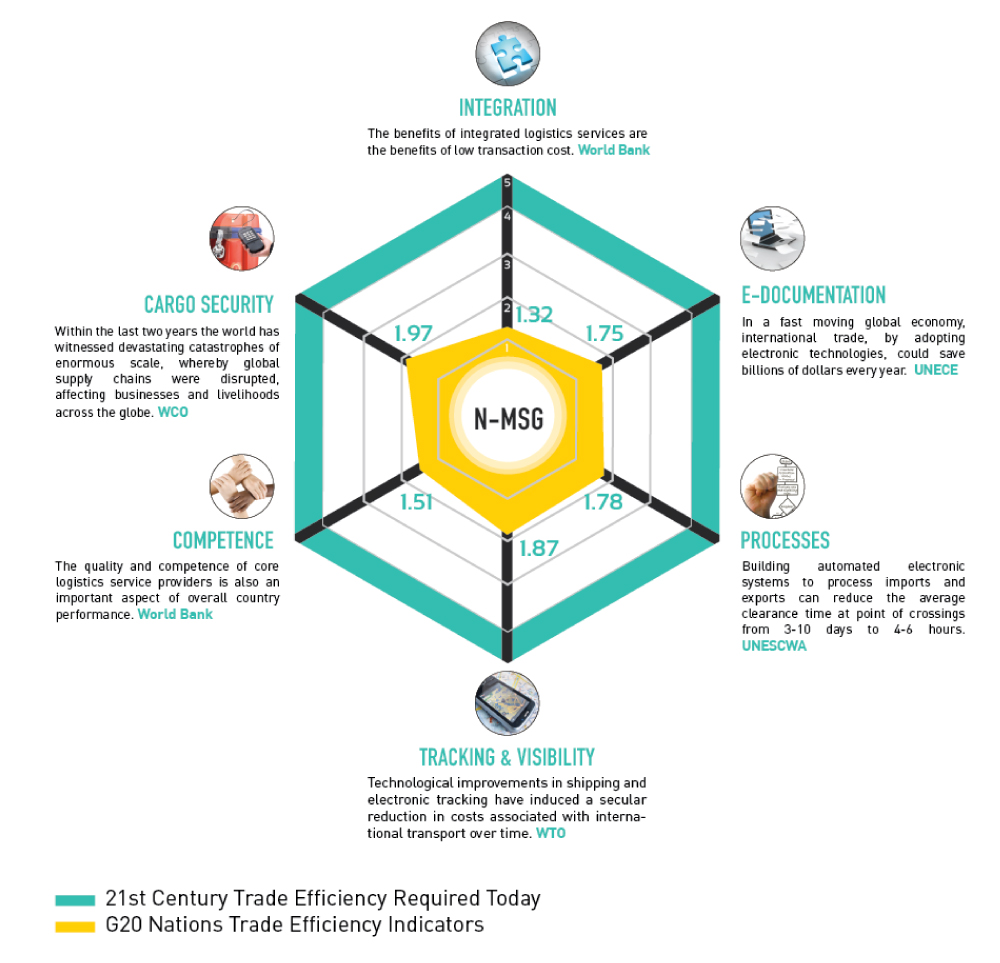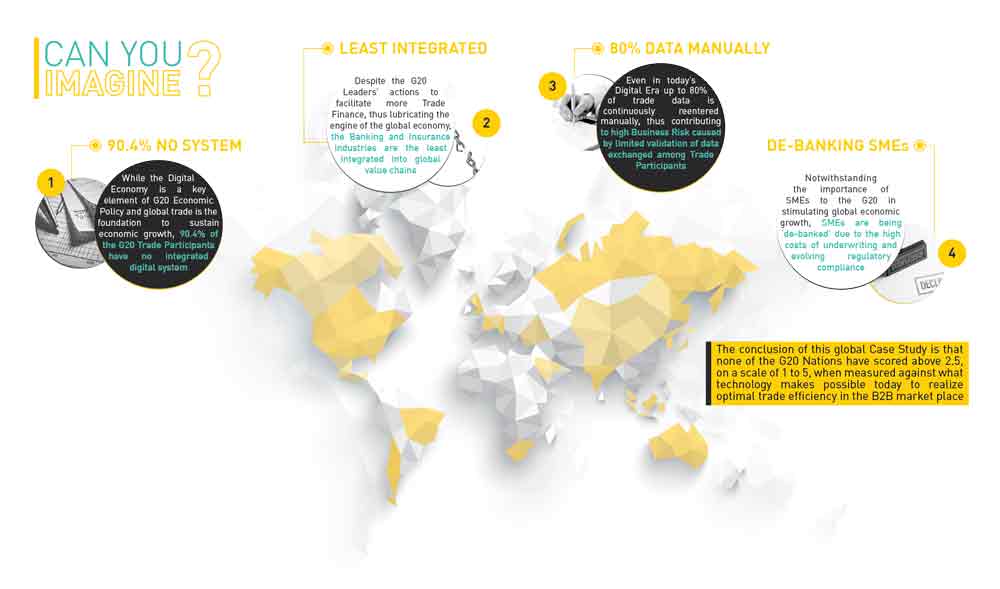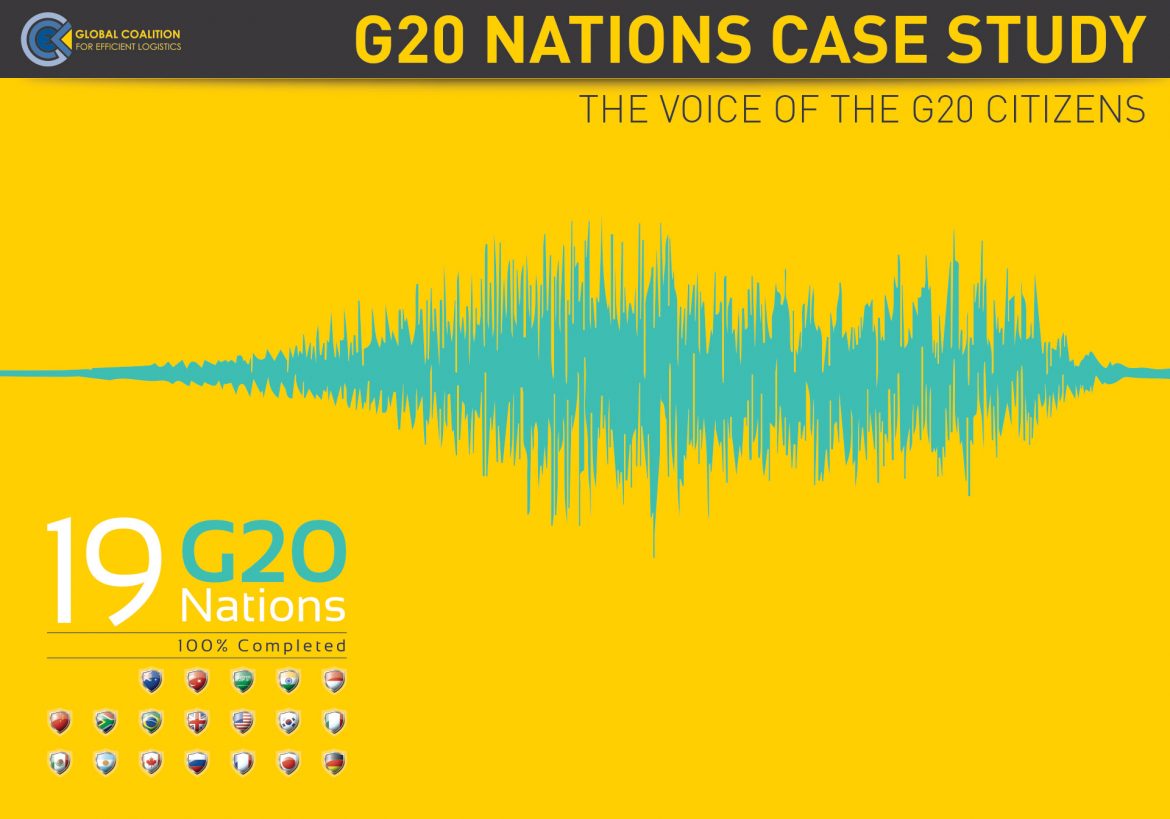G20 Nations Case Study: Following the collection of 1.2 million data points across 19 industry clusters, the results yielded: 90.4% of trade participants have no integrated system and 94.5% want the digital tools to be provided by the DEP, free of cost to the end user.
The Objective Of The Study
To define what digital tools the Real Economy participants need to do a better job on the ground level
The Location
G20 Countries
The Economic Size
78% of The World’s GDP
The Team
71 Ministries, Industry Associations, Academia, and Private Sector Experts
1 – PREMISE
A global coalition of pan-regional organizations, industry associations, academia, and private sector experts have taken seriously their responsibility to contribute towards the achievement of sustained economic growth. They recognize that regulations and international programs are important to promote economic prosperity, however, the results to date are not meeting the economic ambitions of the world’s citizens.
Today, out of the box thinking is required to generate the 600 million jobs needed over the next 15 years. In today’s 21st century technology era, the integrated Digital Economy can reenergize our global economy in a far more efficient way, thus increasing trade, easing access to financing, optimizing existing physical infrastructure to prioritize and attract national and international investments, thereby creating millions of new jobs.
While sound monetary, fiscal and trade policies are important, it is also incumbent upon policy makers to listen to the voice of the real economy participants on the ground level.
The G20 Nations Case Study is a diagnostic assessment of trade efficiency from shelf-to-shelf by measuring six key elements through a new world class standard against what technology makes possible today. The Case Study provides clear recommendations to overcome trade inefficiencies which will drive global trade to a new level.
By understanding the levels of performance that each element must reach and applying the right technological tools to reach them, we empower the era of the Digital Economy.
2- SCOPE
The World Bank’s Logistics Performance Index (LPI) is the current “global standard” of logistics efficiency analysis. The LPI covers various countries around the world, based on a limited, voluntary and self-selected web survey with an average of 8 assessments per country.
The G20 Nations Case Study advances the global standard in 7 important ways towards empowering the Digital Economy to achieve sustainable economic growth.
| Survey Attribute | G20 Nations Case Study | World Bank’s LPI Assessment |
| Scale / Scope | ~ 5,600 entities – ~ 5,600 entities -all private & public organizations related to the Real Economy in 19 nations | ~ 1,100 entities – mostly freight forwarders and express carriers in 132 nations |
| Breadth of Sample | Across all 19 industry clusters including large, medium and small entreprises | Random, some clusters are left behind |
| Geographic Coverage | Encompasses all key economic zones of the country | Random, some zones are left behind |
| Sample Size | Average 300 entities per country ~ 1.2 million data points | Average 8 entities per country ~ 122 thousand data points |
| Direct Sampling | Person-to-Person interviews with “Show Cards” to maximize response accuracy | Electronic and automated means |
| Survey Methodology | Illustrated questions that visualize the inquiry | Online survey |
| Quality Assurance | Over 50% quality control checks undertaken to ensure data accuracy | Limited quality control due to the methodology |
3- STANDARD

The World Bank, UN, APEC, and other international organizations have identified key elements to reduce trade costs towards improving competitiveness.
These elements have now been combined for the first time to represent the new millennium standard for growth – the 21st Century 6 Elements Trade Efficiency Indicators (21-6-ETEI). The 21-6-ETEI comprehensive approach diagnoses the entire real economy trade pipeline, measured against what technology makes possible today; it includes:
- Integration – Digitally connect with trade partners faster at a lower cost, while sharing shipment information in real time.
- E-Documentation – Create, populate and submit documentation among trade partners electronically avoiding unnecessary data entry, shipment delays and additional costs.
- Processes – Mitigate potential business risk such as delays, breakdowns and external requirements changes by adopting simpler and common processes with trade partners.
- Tracking & Visibility – Obtain required real-time shipment location and movement information with minimum technology, at no cost.
- Competence – Meet contractual and service obligations on time, with high quality at minimum cost.
- Cargo Security – Establish a safe environment with ease of customs clearance through high compliance.
The Kiviat chart illustrates the consolidated results of the G20 Nations Case Study. The gap between the green & yellow measures represents the opportunity to improve trade efficiency across each of these 6 elements based on today’s 21st century technology.
The improvement in trade efficiency will reduce trade costs, de-risk business, ease access to finance and insurance as well as increase global trade, thus propelling economic prosperity for generations to come.
4 – THE REALITY CHECK – IN BRIEF
90.4% NO SYSTEM
While the Digital Economy is a key element of G20 Economic Policy and global trade is the foundation to sustain economic growth, 90.4% of the G20 Trade Participants have no integrated digital system
Least integrated
Despite the G20 Leaders’ actions to facilitate more Trade Finance, thus lubricating the engine of the global economy, the Banking and Insurance industries are the least integrated into global value chains.
80% Data manually
Even in today’s Digital Era up to 80% of trade data is continuously reentered manually, thus contributing to high Business Risk caused by limited validation of data exchanged among Trade Participants
De-banking SMEs
Notwithstanding the importance of SMEs to the G20 in stimulating global economic growth, SMEs are being ‘de-banked’ due to the high costs of underwriting and evolving regulatory compliance
The conclusion of this global Case Study is that none of the G20 Nations have scored above 2.5, on a scale of 1 to 5, when measured against what technology makes possible today to realize optimal trade efficiency in the B2B market place
5- THE DIGITAL ECONOMY PLATFORM BENEFITS
Decrease Trade Costs
Worldwide = USD 3.7 trillion
G20 Nations = USD 2.9 trillion
Increase Trade
Worldwide = USD 7.7 trillion
G20 Nations = USD 4.6 trillion
Job Creation
Worldwide = 310 million
G20 Nations = over 150 million
Sustainable Global Economic Growth
Increase world’s GDP by 17% through 2030
For the first time ever, the functionality of the Digital Economy has been commonly defined and agreed by the G20 Citizens in the B2B market place -> 94.5% want the Digital Economy Platform proposed by GCEL.

